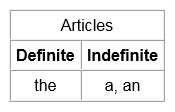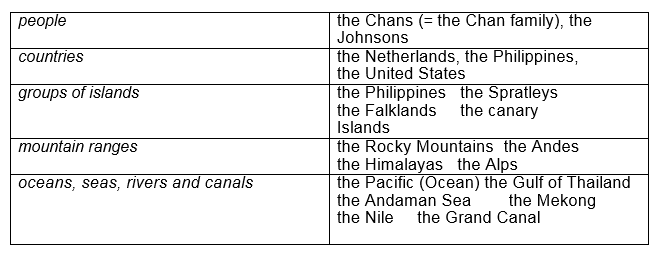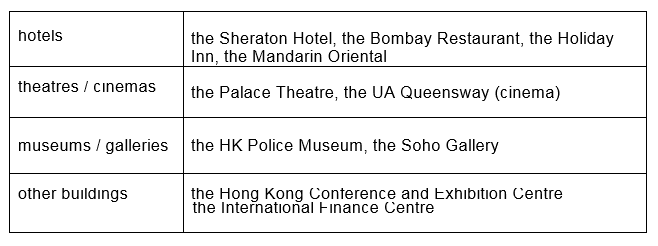Learning Outcomes
This package will help you revise the use the definite and indefinite articles ( the and a/an) and when articles are omitted.
Awareness
Before we look at this in detail, think about these questions.
1. How many articles are there?
2. What are they?
3. When would you usually use a and an?
4. Why would you say a university but an umbrella?
5. Which of these would you put a definite article in front of?
| |
Peninsula Hotel |
Hong Kong University |
| |
China |
People’s Republic of China |
| |
South China Morning Post |
South China Sea |
| |
IBM |
Nathan Road |
| |
Legco |
TVB |
6. Which article would you use if you were introducing something new to someone?
7. Which article would you use if you were talking about something that your listener was already aware of?
8. What is the difference between these three sentences?
a). A student needs to work hard.
b). Students need to work hard.
c). The students need to work hard.
9. Would you put an article in the gaps in these sentences?
| a). I’m going ______ home. |
b). ______ school that I went to has closed down now. |
| c). He’s in ______ hospital. |
d). When I began life at ______ university, I was quite naive. |
| e). Let’s have ______ dinner tomorrow |
f). I’m going to Taiwan for ______ Chinese New Year |
Page 1
Page 2
Page 3
Page 4
Page 5
Rating Form
Form, Use and Meaning
Compare a and the in these examples:
I had a croissant and an apple for lunch. The croissant wasn't very good, but the apple was nice.
In this example, the person says 'a croissant', 'an apple' because this is the first time they talk about them. The speaker says 'the croissant', 'the apple' in the second instance because the listener knows which croissant and which apple they mean - the croissant and the apple that they had for lunch.
The and a/an are called "articles". We divide them into "definite" and "indefinite" like this:

We use "definite" to mean sure, certain. "Definite" is particular.
We use "indefinite" to mean not sure, not certain. "Indefinite" is general.
When we are talking about one thing in particular, we use the. When we are talking about one thing in general, we use a or an.
- Think of the sky at night. In the sky we see 1 moon and millions of stars. So normally we would say:
- I saw the moon last night.
- I saw a star last night.
Look at these examples:

Of course, often we can use the or a/an for the same word. It depends on the situation, not the word. Look at these examples:
- We need to get an umbrella. (Any umbrella, not a particular umbrella.)
- Damn, I’ve left the umbrella on the bus? (We already have an umbrella. We have left our umbrella, a particular umbrella on the bus.)
This little story should help you understand the difference between the and a, an:
A man and a woman were walking along Nathan Road. The woman noticed a magazine that she liked in a convenience store. She asked the man if he could get the magazine for her. He replied: "Do you think the shop will accept a $1,000 note? I don’t have an octopus card."
Compare a and the in these examples:
- A man and a woman were sitting opposite me. I think the man was North Korean, and the woman was South Korean.
- When we were in Europe, we stayed at a cheap backpackers’ hostel. Sometimes we ate at the hostel but usually we went out to a street stall nearby.
We use the when we are thinking of a specific thing. Compare a/an and the:
- Elly lay down on a sunbed. (one of many sunbeds around the pool)
- She lay down on the sunbed nearest the bar. (a specific sunbed)
- Megan is looking for a job. (not a specific job)
Did Megan get the job she applied for? (a specific job)
We use the when it is clear in the situation which thing or person we mean.
For example, in a room we talk about the light / the floor / the ceiling / the door / the carpet etc…
- Can you turn down the TV, please? (= the television in this room)
- I took a taxi to the airport. (= the airport in or near that city)
- (in a bank) Could I talk to the manager, please? (= the manager of this bank)
In the same way, we say (go to) the bank, the post office, supermarket, cinema even though there is probably more than one of them:
- I’m going to the supermarket and then the news agents. (The speaker is usually thinking of a specific supermarket or news agents.)
We also say (go to) the doctor / the dentist / school / hospital / vet:
- My dog isn't very well. I’m taking him to the vet. (= the usual vet)
- I hate going to the dentist.
Compare the and a:
- I have to go to the bank today.
Is there a bank near here?
- I don't like going to the dentist.
My sister is a dentist.
Note
We say 'once a week / twice a day / three times a year / $11.50 a kilo' etc…
- 'How often do you play tennis?' 'About twice a week.'
- 'How much is the garoupa?' '$91.50 a pound.'
- Sally works at least ten hours a day, six days a week, twelve months a year – she never seems to have a break.
Other Uses of Definite and Indefinite Articles
Geographical and place names
We use the when there is only one of something:
- The Amazon is the longest river in the world? (there is only one longest river)
- The earth goes round the sun and the moon goes round the earth.
- Have you ever crossed the equator?
Don't forget the:
- Peking is the capital of China. (not Peking is capital of ... )
But we use a/an to say what kind of thing something is. Compare the and a:
- The sun is not a planet, it’s a star. (= one of many stars)
- The campsite we stayed at was a very nice campsite. (= the one we stayed at)
We say: the sky, the sea, the ground, the country, the environment.
- We looked up at all the stars in the sky. (not in sky)
- Would you like to live in the country? (= as opposed to an urban environment)
- We must do more to protect the environment. (= the natural world around us)
But we say space (without the) when we mean 'space in the universe'. Note, we say the universe. Compare:
- There are millions of stars in space. (not in the space)
- I tried to park my car, but the space was too small.
We usually do not use the with the names of countries:
Britain Thailand Cambodia Japan Brazil China
But we use the in names with Republic, Kingdom, States etc...
the Czech Republic the United Kingdom (the UK)
the Dominican Republic the United States of America (the USA)
the Democratic People’s Republic of North Korea
the People’s republic of China (the PRC)
Compare:
Have you been to Canada or the United States?
We say:
the north (of Thailand) but northern Thailand (without the)
the south-east (of Asia) but south-eastern/east Asia
Compare:
Tibet is in western Asia; Indonesia is in the south.
Also the Middle East, the Far East. We also use north/south etc. (without the) in the names of some regions and countries:
North America South Africa
Note that on maps, the is not usually included in the name.
Breakfast, lunch and dinner
We do not normally use the with the names of meals:
- What did you both have for dinner?
- We had lunch in a gorgeous little bistro yesterday.
- What time is breakfast?
But we use a if there is an adjective before breakfast, lunch etc.
- We had a lovely lunch. (not We had lovely lunch)
Before nouns & numbers
We do not use the before noun + number. For example, we say:
- Our train leaves from Platform 8. (not the Platform 8)
- I’ll meet you at Terminal 3. (not the Terminal 3)
- (in a shop) Have you got these shoes in size 7? (not the size 7)
In the same way, we say: Room 126 (in a hotel), page 45 (of a book), question 2 (in an exam), Gate 10 (at an airport) etc.
People’s names
We do not use the with names of people ('Helen', 'KK Leung' etc.).
When we use Mr/Mrs/Captain/Doctor etc… + a name, we do not use the. So we say:
Mr Wong I Doctor Wong I Captain Wong I President Wong etc. (not the ... )
Uncle Robert I Saint Catherine I Princess Maria etc. (not the ... )
Compare:
We called the doctor.
We called Doctor Wong. (not the Doctor Wong)
We use the with plural names of people and places:

Streets and Buildings
We do not use the with names of most city streets/roads/squares/parks etc. :
Des Voeux Road
(not the ... ) Pedder Street Victoria Park
Queens Road East Lan Kwai Fong Times Square
Most other named buildings use the. For example:

Newspapers and Organizations
Most newspapers and many organisations have names with the:

Now try these practice exercises. Refer back to the rules on page 3 if you are unsure of the answer.
Paraphrasing words and phrases
Compare the original text and a paraphrase. Can you identify paraphrased words and phrases?
Original text
At a recent Royal Society of Medicine conference, Dr. Spence said colour, lighting and ambience could all impact our perception of taste when eating. His experiments show that red-coloured food gives an increased perception of sweetness and the colour of the plate the food is on can have an impact too. Playing music or sounds appropriate to the food we are eating can also accentuate its taste. Even the sound of a crisp being crunched can influence our view of its freshness, making manufacturers focus on the crunchiest crisp possible
Paraphrase
As reported at a conference held by the Royal Society of Medicine, research conducted by Dr. Spence indicate that the taste of food is influenced by several factors: colour, illumination, the setting, and sounds. The color red, for example, emphasized sensitivity to sweet tastes. This sensitivity can be caused by the color of the food and also the color of the serving dishes. The addition of sounds – like music or the crunching noise of potato chips – can influence our perception of how fresh food is and how it tastes.
In the first column, you'll see words or phrases from the original text. Find the best match for the word or phrase in the paraphrase. Then, in the second column, type your answer in the box.
Reorganizing sentence structures and ideas.
Read the original paragraph.
Original
Smell is a particularly powerful driver of taste. This connection between smell and taste has been the subject of studies conducted by Dr. Charles Spence, from Oxford University's department of experimental psychology. His work on understanding the brain's role in our food preferences has attracted attention from a number of chefs whose interest in neurogastronomy is not surprising. Dr. Spence explains that a "big aroma" produces a "big flavor hit." His research shows that "many big companies and top restaurants want to harness that reaction. They want to know which product will give rise to the greatest blood flow to the orbitofrontal cortex of the brain." When the receptors pick up the signal for taste, it travels to this part of the brain, located in the middle of the forehead.
Summarizing
A key difference between paraphrasing and summarizing is the amount of condensing, or shortening, of the text. A paraphrase includes the main and supporting ideas. A summary condenses to just the main ideas.
Writing a summary paragraph
Using your notes, could you write a summary paragraph of the "Why taste is all in the senses" article?
When writing a summary paragraph, complete the following steps:
- In your first sentence, identify the author, the title of the article, and the author’s main idea for the entire article, or thesis statement.
- In the following sentences, focus on the ideas in the order that they appear in the article. Generally, you should include the three most important points of the article.
- Use transitions and attributive tags* to move your reader from one idea to the next.
- Give attention to the main points in proportion to how they appear in the article. In other words, if the author discusses Topic A for two paragraphs and Topic B for two pages, then your summary should include more information about Topic B.
- Do not include your personal opinions in the summary.
- Conclude with a sentence that summarizes the main points of the article.
Checking your progress.
Read the original paragraph and then complete the exercise below.
Original text
Another genetic variant means that some people are very sensitive to the smell and taste of coriander. For them, the green herb often found in curries and salads tastes like soap. According to Dr. Barry Smith, professor of philosophy and director of the Centre for the Study of the Senses at the University of London, we use all of our senses when we taste food. Smith explains, "you get the smell contributing and the touch, how smooth or creamy it is, and they all fuse together to give flavour." In other words, the intensity of a food's salty, bitter, or sweet flavor is dependent on the number of receptors working at the same time on our tongues.
The most important point to consider when deciding between a paraphrase and summary is what your goal is. If your writing needs supporting details, then a paraphrase is probably the best choice. If your writing needs to cover just the main ideas, then a summary is probably the best choice. Both paraphrasing and summarizing are effective when used appropriately.
To sum up. . .
When incorporating sources into your writing, be sure to attribute sources, to reorganize ideas, to reorganize sentence structures, and to substitute words.
Paraphrasing and summarizing have similarities, but they differ in the amount of condensing.
- Paraphrasing = a slight condensing of the original (with supporting details)
- Summarizing = a condensing of the original (just main ideas)
The key to successful paraphrasing and summarizing is to understand the text, write it in your own words, and check to make sure you have not changed the meaning.
Click the tabs to show contents.





